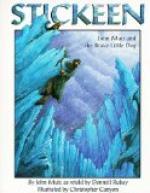Thereafter Stickeen was a changed dog. During the rest of the trip, instead of holding aloof, he always lay by my side, tried to keep me constantly in sight, and would hardly accept a morsel of food, however tempting, from any hand but mine. At night, when all was quiet about the camp-fire, he would come to me and rest his head on my knee with a look of devotion as if I were his god. And often as he caught my eye he seemed to be trying to say, “Wasn’t that an awful time we had together on the glacier?”
* * * * *
Nothing in after years has dimmed that Alaska storm-day. As I write it all comes rushing and roaring to mind as if I were again in the heart of it. Again I see the gray flying clouds with their rain-floods and snow, the ice-cliffs towering above the shrinking forest, the majestic ice-cascade, the vast glacier outspread before its white mountain fountains, and in the heart of it the tremendous crevasse,—emblem of the valley of the shadow of death,—low clouds trailing over it, the snow falling into it; and on its brink I see little Stickeen, and I hear his cries for help and his shouts of joy. I have known many dogs, and many a story I could tell of their wisdom and devotion; but to none do I owe so much as to Stickeen. At first the least promising and least known of my dog-friends, he suddenly became the best known of them all. Our storm-battle for life brought him to light, and through him as through a window I have ever since been looking with deeper sympathy into all my fellow mortals.
None of Stickeen’s friends knows what finally became of him. After my work for the season was done I departed for California, and I never saw the dear little fellow again. In reply to anxious inquiries his master wrote me that in the summer of 1883 he was stolen by a tourist at Fort Wrangel and taken away on a steamer. His fate is wrapped in mystery. Doubtless he has left this world—crossed the last crevasse—and gone to another. But he will not be forgotten. To me Stickeen is immortal.




